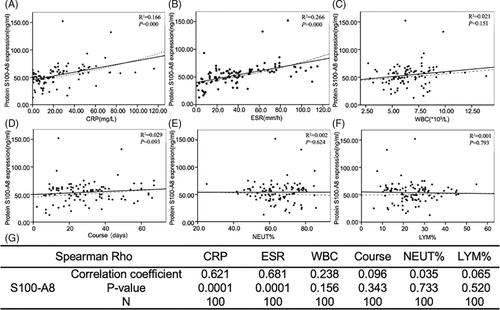Analysis of the value of potential biomarker S100-A8 protein in the diagnosis and pathogenesis of spinal tuberculosis
Abstract
Objectives
The objective of this study is to evaluate the value of S100-A8 protein as a diagnostic marker for spinal tuberculosis and to explore its role in the potential pathogenesis of spinal tuberculosis (STB).
Methods
The peripheral blood of 100 spinal tuberculosis patients admitted to the General Hospital of Ningxia Medical University from September 2018 to June 2021 were collected as the observation group, and the peripheral blood of 30 healthy medical examiners were collected as the control group. Three samples from the observation group and three samples from the control group were selected for proteomics detection and screening of differential proteins. Kyoto Encyclopedia of Genes (KEGG) was used to enrich and analyze related signaling pathways to confirm the target protein. The serum expression levels of the target proteins were determined and compared between the two groups using enzyme-linked immunosorbent assay (ELISA). Statistical methods were used to evaluate the value of target protein as a diagnostic marker for STB. A macrophage model of Mycobacterium tuberculosis infection was constructed and S100-A8 small interfering RNA was used to investigate the molecular mechanism of the target protein.
Results
S100-A8 protein has the value of diagnosing spinal tuberculosis (AUC = 0.931, p < 0.001), and the expression level in the peripheral blood of the observation group (59.04 ± 19.37 ng/mL) was significantly higher than that of the control group (43.16 ± 10.07 ng/mL) (p < 0.05). S100-A8 protein expression showed a significant positive correlation with both CRP and ESR values (p < 0.01). Its AUCs for combined bacteriological detection, T-SPOT results, diagnostic imaging, antacid staining results, and pathological results were 0.705 (p < 0.05), 0.754 (p < 0.01), 0.716 (p < 0.01), 0.656 (p < 0.05), and 0.681 (p < 0.01), respectively. Lack of S100-A8 leads to a significant decrease in the expression levels of TLR4 and IL-17A in infected macrophages.
Conclusion
S100-A8 protein is differentially expressed in the peripheral blood of patients with spinal tuberculosis and healthy individuals and may be a novel candidate biomarker for the diagnosis of spinal tuberculosis. The feedback loop on the S100-A8-TLR4-IL-17A axis may play an important role in the inflammatory mechanism of spinal tuberculosis.


 求助内容:
求助内容: 应助结果提醒方式:
应助结果提醒方式:


